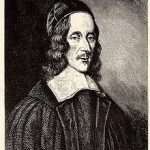Arriving back at 11.30 pm, it has been a long and tiring day, but tiredness is something that seems consonant with Irish spirituality; that tradition in the days of the monasteries where superhuman effort is assumed as a matter of course. Perhaps in a country where there were no ‘red’ martyrs, no-one who died for their faith, seeking exhaustion, pushing oneself to physical extremes was part of the ‘white’ martyrdom the monks sought.
No matter what the day, no matter how tiring, George Herbert the 17th Century English priest, saw it as an opportunity for an encounter with the divine. George Herbert’s most famous hymn begins:
Teach me, my God and King,
in all things thee to see,
and what I do in anything
to do it as for thee.
Herbert was never one not to practice what he preached, he took his own words with deadly earnest, the writer Izaak Walton describes one incident.
Mr Herbert’s chiefest recreation was music in which heavenly art he was a most excellent master, and did himself compose many divine hymns and anthems, which he set and sung to his lute or viol, and though he was a lover of retiredness, yet his love to music was such that he went usually twice every week, on certain appointed days, to the Cathedral Church in Salisbury; and at his return would say, “that his time spent in prayer and Cathedral music elevated his soul, and was his heaven upon earth.” But before his return to Bemerton, he would usually sing and play his part at an appointed private music meeting; and to justify this practice he would often say ” Religion does not banish mirth, but only moderates and sets rules to it.”
In one of his walks to Salisbury, he saw a poor man with a poorer horse, that was fallen under his load: they were both in distress and needed present help; which Mr Herbert perceiving, put off his canonical coat and helped the poor man to unload, and after to load his horse. The poor man blessed him for it, and he blessed the poor man; and was so like the good Samaritan, that he gave him money to refresh both himself and his horse; and told him, “That if he loved himself, he should be merciful to his beast.” Thus he left the poor man: and at his coming to his musical friends in Salisbury, they began to wonder that Mr George Herbert, which used to be so trim and clean, came into that company so soiled and discomposed: but he told them the occasion. And when one of the company told him, “He had disparaged himself by so dirty an employment,” his answer was, “That the thought of what he had done would prove music to him at midnight; and that the omission of it would have upbraided and made discord in his conscience, whenever he should pass by that place: for if I be bound to pray for all that be in distress, I am sure that I am bound so far as it is in my power, to practise what I pray for. And although I do not wish for the like occasion every day, yet let me tell you, I would not willingly pass one day of my life without comforting a sad soul, or showing mercy, and I praise God for this occasion. And now let us tune our instruments. “
George Herbert would loved to have arrived home late and tired.
